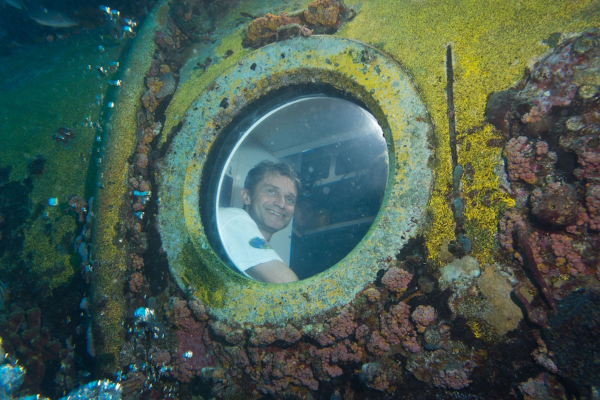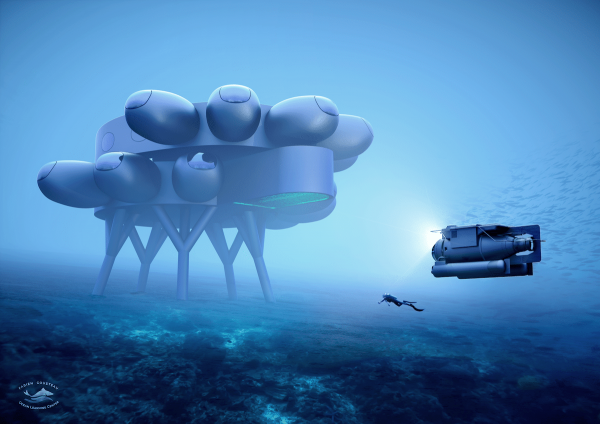Jacques-Yves Cousteau’s Grandson Is Building His Grandfather’s Dream
Fabien Cousteau, the first grandson of famed oceanic explorer Jacques-Yves Cousteau, has lived most of his life either in or around the sea spending time on Calypso and Alcyone, his grandfather’s ships.
He learned to scuba dive at the tender age of four. As an adult he sponsored and participated in countless projects but the plans for his most ambitious project are about to be unveiled.
Cousteau is fundraising to build a four thousand square foot underwater environment in the ocean where researchers can live while they do their work.

It is named Proteus after the Greek god who was said to protect the seas and rivers and was Poseidon’s right hand man. According to fabiencousteauolc.org, the limitations on the amount of time a human can spend in deep water put aquatic researchers at a disadvantage.
With only two to three hours underwater and the time it takes to gradually decompress on the way back up some divers have no choice but to stop in the middle of a project and return to the surface for a full day.
With the Proteus scientists can stay focused on a project until it is completed and don’t have to deal with the fumbling caused by underwater equipment not to mention threatening sea creatures. Natural compounds found at the bottom of the sea are essential in developing new drugs and other research will address the problems of overpopulation and changing weather.

The website tells us that only five percent of the ocean has been explored with only one percent of the deepest parts. The goal is “To offer scientists and academics an essential state of the art research lab and a platform to give rise to disruptive scientific breakthroughs in areas such as medicine, genetics, sustainable energy and food cultivation.”
Forbes.com tells us the Proteus will be an ambient pressure habitat, meaning the interior atmospheric pressure is equal to the surrounding water pressure. There will be a large laboratory, a video studio, a medical bay, living and sleeping areas and a hydroponic garden to supply researchers with fresh food.
There is also lifeline for providing fresh air and communications and the station will be modular which will allow for expansion. Cousteau estimates that it will cost about three million dollars annually to run the station but they will charge universities and corporations to work there in order to offset the costs. Research will be allowed for everything except warfare related projects.
In 2014 Mission 31 honored the fiftieth anniversary of an historic expedition led by Jacques-Yves Cousteau in the Red Sea, Conshelf II, in which he proved that humans could stay on the seafloor for long periods of time.
Fabien Cousteau and six of his colleagues spent a month living in the Aquarius, a present day undersea laboratory run by National Oceanic and Atmospheric Administration. Built in 1986 it was first stationed near the U.S. Virgin Islands but in 1997 it was moved to the Florida Keys on Conch Reef about three miles from Key Largo.

With only four hundred square feet of space to accommodate the laboratory and living spaces it makes for close quarters and limited numbers of researchers. The time spent on the ocean floor gave Cousteau time to observe the successes and failures of the underwater lab which gave him insight on what will be needed on the Proteus.
In 2016 Cousteau opened the Ocean Learning Center, a non-profit entity which was “created to empower local communities to champion ocean conservation in ways that are most meaningful to them.” according to fabiencousteauolc.org.
He has made a number of documentaries and written books on ocean conservation as well as being a champion for sharks hoping to change the public’s ideas about them being mindless killers. Some of the current ongoing projects include sea turtle and mangrove restoration, coral reef protection and restoration and beach cleanups.
Another Article From Us: Ice Age Mining Camp Found ‘frozen in time’ in Underwater Cave
The goal of the fundraiser for the Proteus is one hundred and thirty five million dollars and sources such as Rutgers University, Northeastern University and the Caribbean Research and Management of Biodiversity are making a huge difference in helping to preserve and study the ocean.





